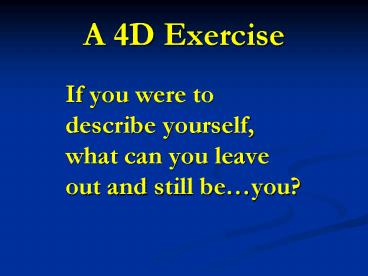A 4D Exercise - PowerPoint PPT Presentation
1 / 15
Title:
A 4D Exercise
Description:
Feral Humans, like Genie. A 4D Exercise. Friendships and family. Groups and Organizations ... Your stakeholders (and you) are likely to reason in all these ways ... – PowerPoint PPT presentation
Number of Views:23
Avg rating:3.0/5.0
Title: A 4D Exercise
1
A 4D Exercise
- If you were to describe yourself, what can you
leave out and still beyou?
2
A 4D Exercise
Friends and Family Members
Talents, skills, resources
Members of Groups and Organizations
Believers in HD
3
A 4D Exercise
Friends and Family Members
Talents, skills, resources
Members of Groups and Organizations
4
A 4D Exercise
Friends and Family Members
Talents, skills, resources
5
A 4D Exercise
Talents, skills, resources
6
A 4D Exercise
Talents, skills, resources
Learned from whom? Used for what?
7
A 4D Exercise
Without society, we are
Feral Humans, like Genie
8
A 4D Exercise
The best societies and organizations allows us to
develop
Talents, skills, resources
Friendships and family
Groups and Organizations
Human Dignity
9
Leadership Lessons
10
Lesson I
- Psychology and Individuals
- People take SD, RD, GD, HD seriously (Kohlberg
and Gilligan) - Your stakeholders (and you) are likely to reason
in all these ways - Make and explain your decisions in these terms
- Leadership Hypothesis
- The more Ds you have at your disposal, the better
leader you will be
11
Lesson II
- Psychology and Organizations
- How you design risk-reward systems will affect
how employees pursue SD, RD, GD, HD (Trevino,
Gioia) - This, in turn, will affect productivity and
reputation - Leadership Hypothesis
- Designing risk-reward systems that reward all the
Ds will be more effective than those that reward
three or fewer.
12
Lesson III
- Managers are social engineers leaders understand
this fact. - Every decision affects how employees, and you,
can pursue SD, RD, GD, HD - Leadership Hypothesis
- Constitutive leaders have a vision of what a
healthy, integrated set of the 4Ds looks like and
how it can be implemented
13
Summary of Leadership Lessons
- The more Ds you have at your disposal, the better
leader you will be - Designing risk-reward systems that reward all the
Ds will be more effective than those that reward
three or fewer - Constitutive leaders have a vision of what a
healthy, integrated set of the 4Ds looks like and
how it can be implemented - Constitutive Leaders know when to be regulative
14
Constitutive Leadership and Self-Knowledge
- Constitutive Leaders Understand and are Committed
to - Strong and nurturing relationships
- Promoting the good of groups they affect
- A respect for each and every human being
- Integrity and Courage flow from their knowledge
and commitments
15
The 4Ds, Integrity, and Courage
- Most of us develop integrity and courage when we
fail, and understand why we fail, to support
friends, groups, human dignity, or our ourselves
in a stressful stituation. - That we can see them as failures is a sign of
ethical health - Lets stand on our failures to reach our higher
selves































